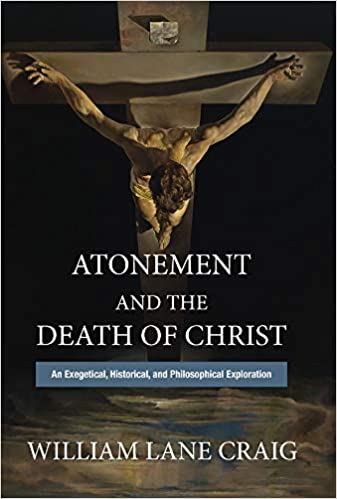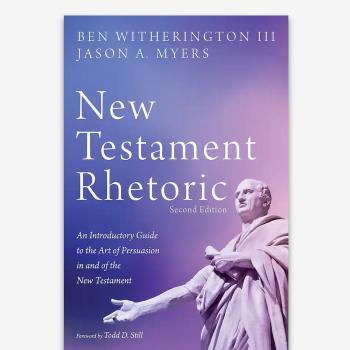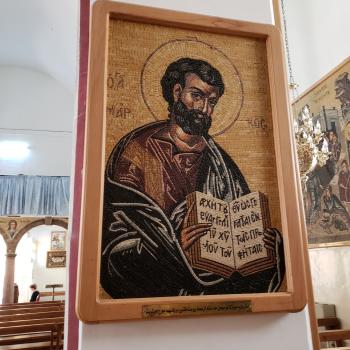Q. You say on p. 184 that every orthodox Christian not only affirms that Christ did not sin, but that he could not sin. Actually, this is not true. Plenty of orthodox Christians say that Christ’s temptations were real, and his resisting them meritorious, virtuous. If he could not do otherwise, there is no virtue in that, never mind no free choosing of the good. Perhaps it would be better to say the following, as Phil. 2.5-11 suggests. In the incarnation, without ceasing to be God’s only begotten Son, Christ limited himself. Or put another way, he put the omnis on hold. A very good philosopher, Tom Morris has explored this idea quite profitably in his The Logic of God Incarnate. Christ lived his life as a genuine human being, accepting the limitations of time, space, knowledge, power, and mortality in order to be fully human. Sin is not a normal human limitation. So, Christ lived as Adam gone right, and his resistance of temptation is not because he has a divine nature, but because he resists temptation through the help of the Word of God and the Spirit of God (see Luke 4 and par.), two resources every human being has to draw on. I am not suggesting the traditional ‘kenosis’ theory that the Son emptied himself of his portion of the divine identity. I am suggesting that he found a way to be truly human, and this involves some mystery. Temptations are not real temptations if one could not have done otherwise, and as the NT also says God can’t be tempted. The essence of the temptation in Luke 4 is ‘if you are the divine Son of God turn these stones into bread’. It is a temptation only a divine Son of God would be prone to. He is tempted to push the God button which he actually has, but if he does so, he will cease to be genuinely human. Indeed, all the temptations actually mentioned in the Gospels both in Luke 4 and in the Garden of Gethsemane are not ordinary human temptations (though Hebrews says he suffered those as well). We need to think about the Son being part of the divine identity and at the same time being truly human in fresh and more Biblical ways, not locked into to later Greek philosophical categories about ‘ousia’ etc. See Richard Bauckham’s excellent work in regard to talking about Jesus as part of the divine identity (Jesus and the God of Israel), rather than all this two natures stuff from Nicaea and Chalcedon. Comments?
A. I think that these last two questions illustrate so powerfully the truth of what I just previously affirmed about the importance of analytic philosophy for the conceptual clarity necessary for doing careful systematic theology! Of course, Christ could not sin! This is the doctrine of Christ’s impeccability, which is embraced by orthodox Christians. The reason is simple: there is only one person who is Jesus Christ, and that person is divine. He is the second person of the Trinity. He has two complete natures, human and divine, but there is no human person who is Jesus Christ. Otherwise one falls into the error of Nestorianism. God cannot sin. He is essentially holy and therefore cannot do evil. So Christ, being God, must be impeccable.
But that doesn’t imply that Christ’s temptations were unreal and not freely resisted. One doesn’t need to be able to sin in order to feel the allure of sin (especially if one is unaware that one is impeccable!) The question whether Christ freely resisted sin plunges us inevitably into philosophical debates about the nature of libertarian freedom, specifically whether libertarian freedom implies what philosophers call the Principle of Alternative Possibilities. I think, on the basis of illustrations given by Harry Frankfurt in a famous article, that that principle is false. If a choice is up to you and you are not causally determined in the choice you make, your freely choosing does not require the ability to do otherwise. Tom Morris’ view of the incarnation is very similar to the view I lay out in Philosophical Foundations for a Christian Worldview. On Morris’s view Christ is one person with two minds (self-consciousnesses), and that person is divine and therefore impeccable. It is impossible that Christ could have sinned with respect to his human nature. But in his human mind he felt and freely resisted temptation, despite his impeccability. If we say that Christ could have sinned, then kenosis is unavoidable. As for “all this two natures stuff from Nicaea and Chalcedon,” that’s exactly what I meant by “orthodox Christian!” We should not give up orthodoxy simply on the basis of a philosophical assumption, the Principle of Alternative Possibilities, which can and has been disputed.
As for Bauckham’s view, he recognizes that there is in Judaism a bright dividing line which separates God ontologically from everything else. Bauckham observes that so-called intermediate figures in Judaism fall into one of two categories: (1) beings which are supernatural but nonetheless created, like angels, and (2) personifications of aspects of God Himself which have no independent existence, such as God’s Word and God’s Wisdom. God’s unique status comes to practical expression in the Jewish restriction of worship as properly directed toward God alone. According to Bauckham this restriction “most clearly signaled the distinction between God and all other reality.”4 To my mind that clearly entails that Christ, being God, was impeccable. If not, Bauckham (or somebody) needs to give us an account of how Jesus can “be part of the divine identity” and yet not share in the essential attributes of God. It sounds incoherent to me. (4 Richard Bauckham, “God Crucified,” in Jesus and the God of Israel: God Crucified and Other Studies on the New Testament’s Christology of Divine Identity (Grand Rapids: William B. Eerdmans, 2008), p. 11; cf. idem, “Biblical Theology and the Problems of Monotheism,” in Jesus and the God of Israel, pp. 60-106.)

















